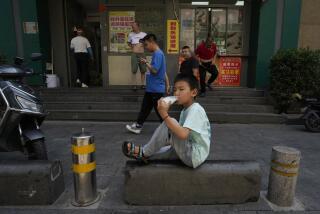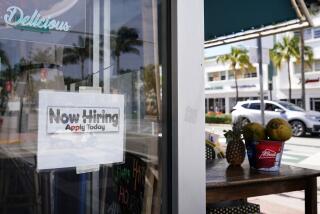Hong Kong Economy Stabilizing as Growth in GDP Slows to 10.8%
- Share via
HONG KONG — The Hong Kong recovery continued at a robust double-digit pace in the second quarter, the government reported Friday, but analysts said economic growth here and across the region is slowing to a more sustainable pace.
The 10.8% annualized rise in gross domestic product was notably weaker than the previous quarter’s 14.3%. Economists both in and out of government agreed that the former British colony is not returning to the extremely high growth levels that preceded the 1997 Asian financial crisis.
Instead, analysts believed that Hong Kong’s economic growth would slow during the second half as it--and several other economies in the Asian region--settled into a longer-term pattern of more modest, but more sustained performance levels.
“We need to understand that the growth is back, but it’s going to be substantially below pre-crisis levels,” noted Morgan Stanley Dean Witter economist Andy Xie. “We’re talking about 4% to 4.5%.”
The government predicted a full-year growth rate of 8.5%. Friday’s report also included strong trade figures and evidence that overall unemployment has begun to ease.
Timothy Condon, chief economist for Asia at ING Barings, said conditions in Hong Kong reflected a broader trend affecting some of the nations hardest hit by the 1997 crisis and fallout from financial turmoil in Russia the following year. He cited Thailand, Malaysia and South Korea as specific examples.
“There’s a pattern in all of them,” Condon said. “The [high] growth coming out of the recession is tapering off. . . . We’re at the beginning of a new cycle here.”
Earlier this week, the International Monetary Fund declared South Korea officially recovered from the 1997 crisis and predicted a growth rate for the current year of 8.5%, followed by a period of slightly lower growth over the medium term--a profile almost identical to that of Hong Kong.
A similar picture exists in Taiwan, where the government recently lowered its annual growth projection to 6.5%.
Though the projected trend of slower, more sustained growth in these economies is viewed as the end of the immediate post-recession cycle in Asia, it also reflects the conventional wisdom that the global economy, including that of the United States, has peaked and is about to enter a period of lower growth.
With international trade a key contributor to Hong Kong’s prosperity, the territory is especially dependent on mainland China and the United States and their huge trade relationship. During the first half of 2000, nearly 60% of Hong Kong’s $86 billion in exports went to either of those two nations.
Analysts say recent indicators from both nations have been favorable for Hong Kong. Mainland China recently revised upward its overall economic growth projection for the year, and signs of slowing in the American economy have eased fears of any imminent action by the U.S. Federal Reserve Bank to raise interest rates.
For Hong Kong, where interest rates are already high in order to maintain its currency’s peg to the dollar, any rise in the U.S. interest rate would be especially crippling for further growth.
Friday’s announcement here came one day after Hong Kong Financial Secretary Donald Tsang said that the current recovery had filtered through to the employment market, where the jobless figure held steady at 5% even though large numbers of school and university graduates traditionally enter the employment market in July.
Despite the generally upbeat tenor of these indicators, patches of gloom remained, keeping many from enjoying the benefits of the new growth and dampening overall consumer confidence.
Among the better-off, high interest rates and a property market that remains in the doldrums have left many homeowners with excessively high mortgages on dwellings with negative equity.
“There are a lot of people feeling squeezed,” Xie said.
Hong Kong’s government also faces a major long-term challenge as the territory restructures its domestic economic base increasingly toward the “dot-com” world. Economists say the shift has already worsened Hong Kong’s large gap between rich and poor and created shortages of skilled workers, even as unskilled laborers watch their manufacturing jobs migrate to cheaper regions.
“It’s an education issue,” Condon said. “And it’s going to require a major government investment.”
(BEGIN TEXT OF INFOBOX / INFOGRAPHIC)
Hong Kong’s GDP
After a deep recession in the wake of the 1997 Asian crisis, Hong Kong’s economy has come roaring back. Quarterly change in gross domestic product:
More to Read
Sign up for Essential California
The most important California stories and recommendations in your inbox every morning.
You may occasionally receive promotional content from the Los Angeles Times.













